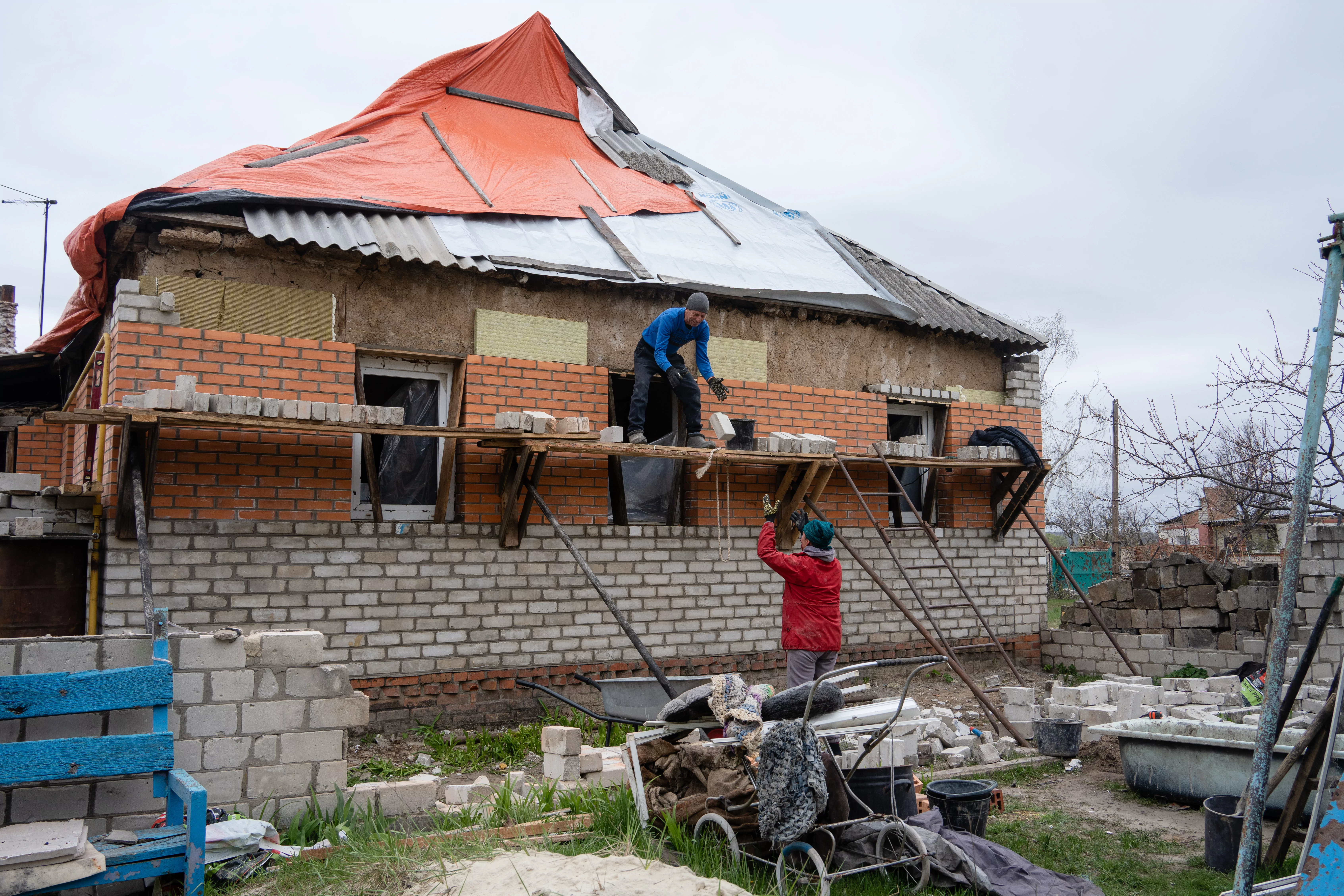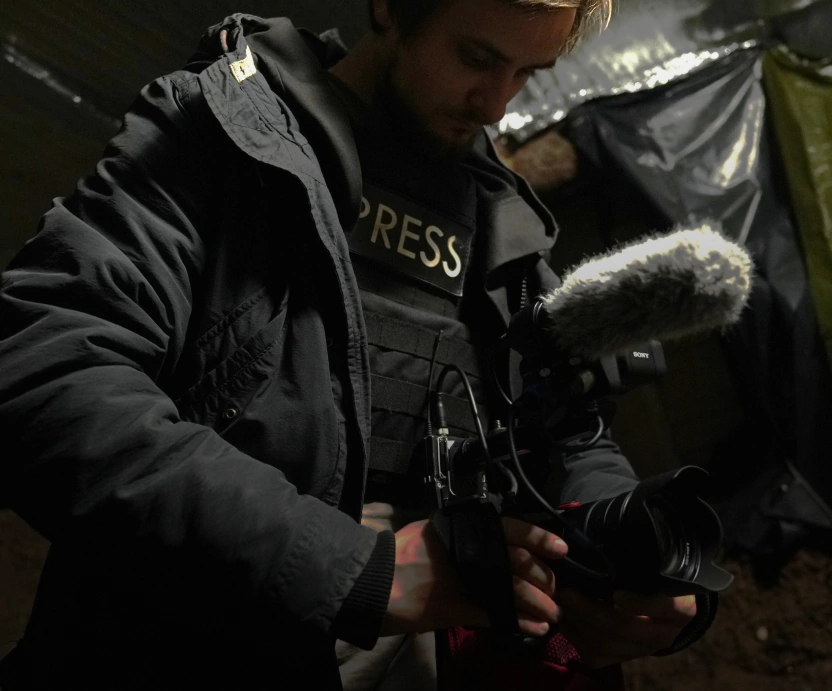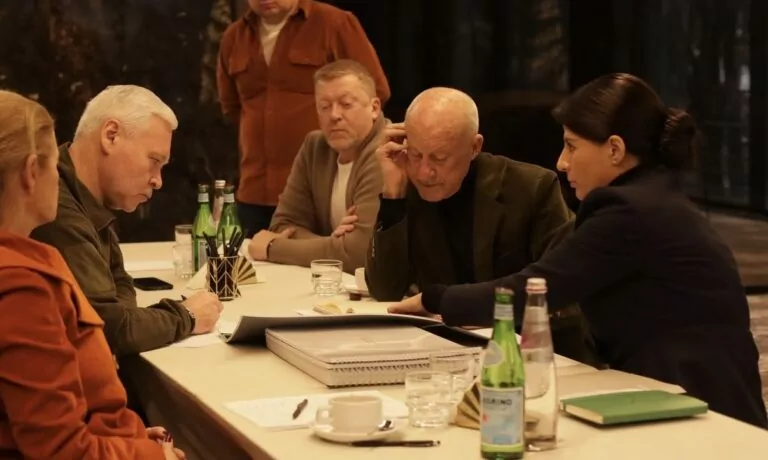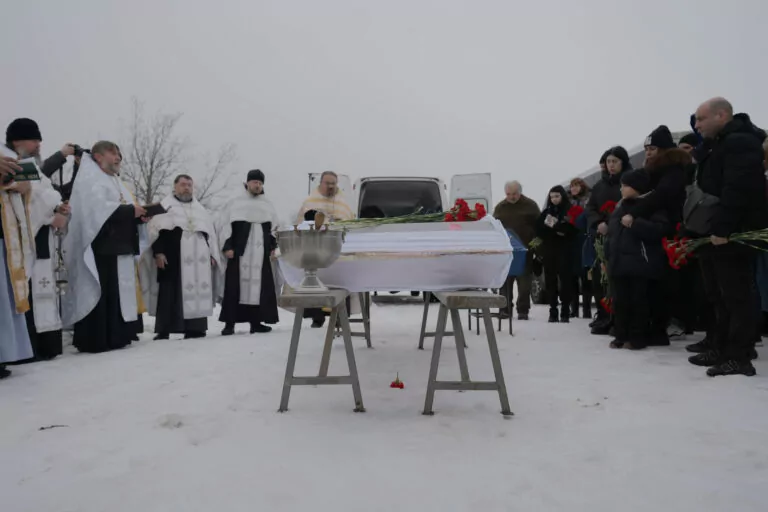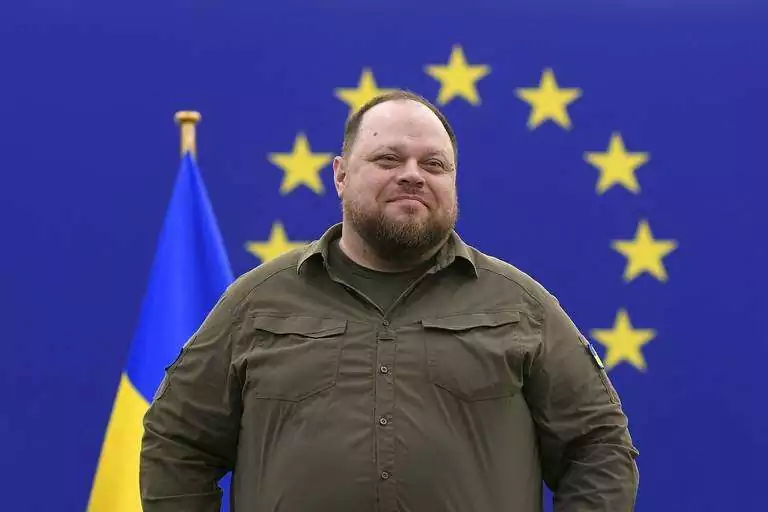Ruski Tyshky is a settlement approximately 25 km from Kharkiv. For two months, the occupiers used it as a springboard for attacks on Ukrainian cities until the Ukrainian army liberated the village on the night of May 5-6, 2022.
Gwara Media journalists spent a day with a family in Ruski Tyshky to see how people build a new life amidst old memories and new challenges.
“Gypsy, come here,” Oksana calls on. “They brought you something to eat.”
Among bags of cement, bricks, and construction debris, a woman stands with cat and dog food packages. She pours food into bowls on the roof of a car burned by a shell explosion.
“He’s not coming, probably walking somewhere. But the cats will run up soon,” says the woman. “Baby is sleeping, and Fox is now in the basement with the puppies.”
Oksana puts the food package on the car roof and heads across the yard to the basement stairs. The woman bends down not to touch the slate that serves as the ceiling and descends underground. A red-haired dog with two blind puppies stares at her from the thatch.
“Don’t worry, they won’t take them away,” smiles Oksana, shining a flashlight on the whimpering Fox with her puppies. “She gave birth recently, on Easter. Now it is our household, born in the basement, where the parents hid from shelling.”
It’s noon. Clouds spread over the village. A cat walks around the yard, hiding behind a pile of bricks from the wind, but the wind catches up. One cannot hide from it even in the house, as the drafts enter through the window frames. The windows have no glass, as it was knocked out by one of those 29 shells that exploded in the yard.
However, the wind cannot reach the basement. The room preserves the warmth of the newly born puppies and the Fox, who made a hay den for her little ones to protect them from the cold. And this yard preserves the memory and restores the life taken away.
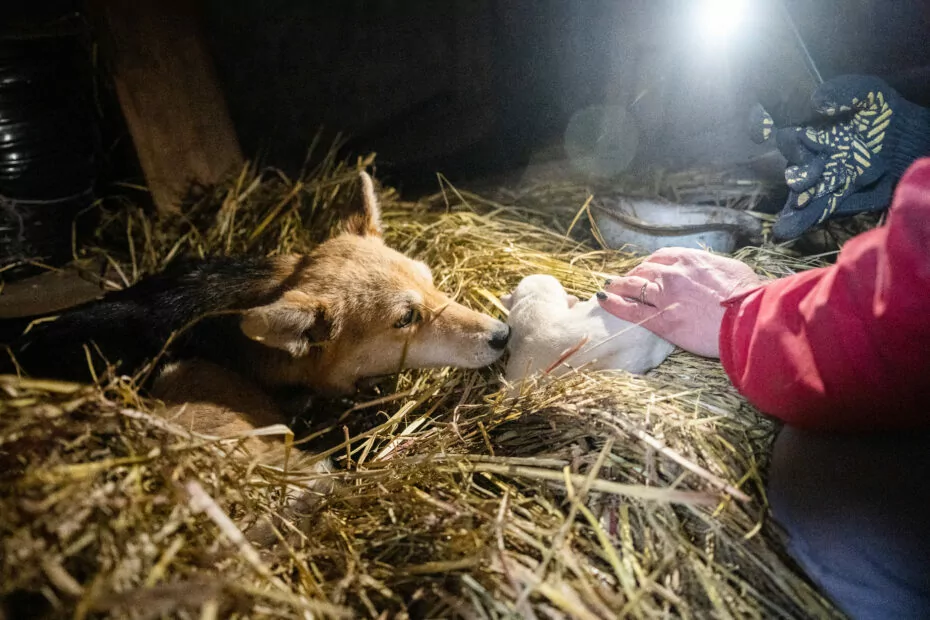
Vitalii
— Vitalik, do you need help?
The man who is covering the brick building shakes his head in denial. “This is my parents’ house,” Oksana points to the house the family is rebuilding. “And this is mine.”
“It was,” Vitalii adds.
— The keyword – it was.
Vitalii stayed in Ruski Tyshky during the occupation. He left the settlement on May 15, 2022, and returned home on Sept. 27. At the time of liberation, less than a thousand residents remained in the village; now there are 3,5 thousand. People return. Among them are Oksana and her father, Oleksii. Vitalii comes to them every day to help them rebuild their house.
“There is no one to build,” says the man. “Who, besides us, will rebuild the house? It will be long before our turn to rebuild from the state or international organizations comes. You have to live somehow, and it’s expensive in the city. Here the earnings were all from the land, and now everything is broken – you can’t make any money.”
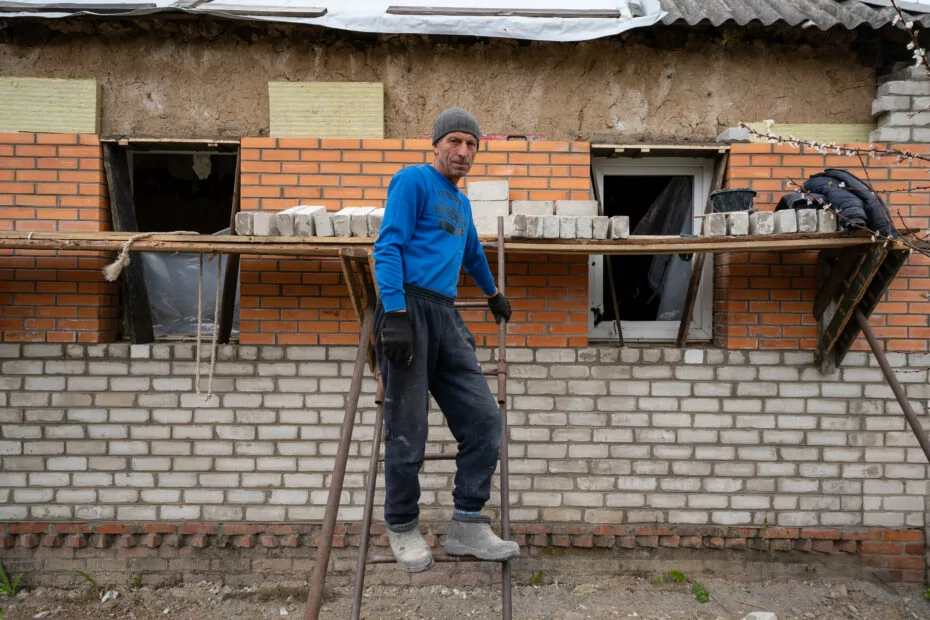
A man climbs onto a wooden structure on which bricks lie. Vitalii has gotten used to the cold in half a day’s work, so he continues his labor despite the draft of the wind, remembering the beginning of a full-scale invasion.
“At five in the morning, I heard volleys and explosions, and at half past seven, the Russians were already here,” recalls Vitalii. “The road to Tsyrkuny was filled in two rows with tanks and self-propelled artillery.”
The Russians occupied Ruski Tyshky on the first day of a full-scale invasion. The critical factor was the location of the village – only 18 kilometers from the border with Russia.
“There was almost no communication, but fortunately, I had a cell signal in my garden – so everyone came there. The neighbor also had it,” says the man. “The Russians all the time sat in the pine trees across the road. Do you see the ammunition boxes over there?”
Across the street from the house stretches a strip of forest with the “Mine Danger” sign on it. Boxes from mines and shells and Russian military uniforms remain here.
“The Russians had headquarters here, and ours [meaning Ukrainian military – ed.] were chasing them. We have formed a habit: we hear a whistle – we run to the basement,” Vitalii says. “But it wasn’t the scariest. The worst began immediately after the liberation of Ruski Tyshky. That’s when all the houses were affected. The first two days were quiet, and the Russians started shelling everything.”
For two months, the occupiers used Ruski Tyshki as a springboard for attacks on Ukrainian cities until the Ukrainian army liberated the village on the night of May 5-6.
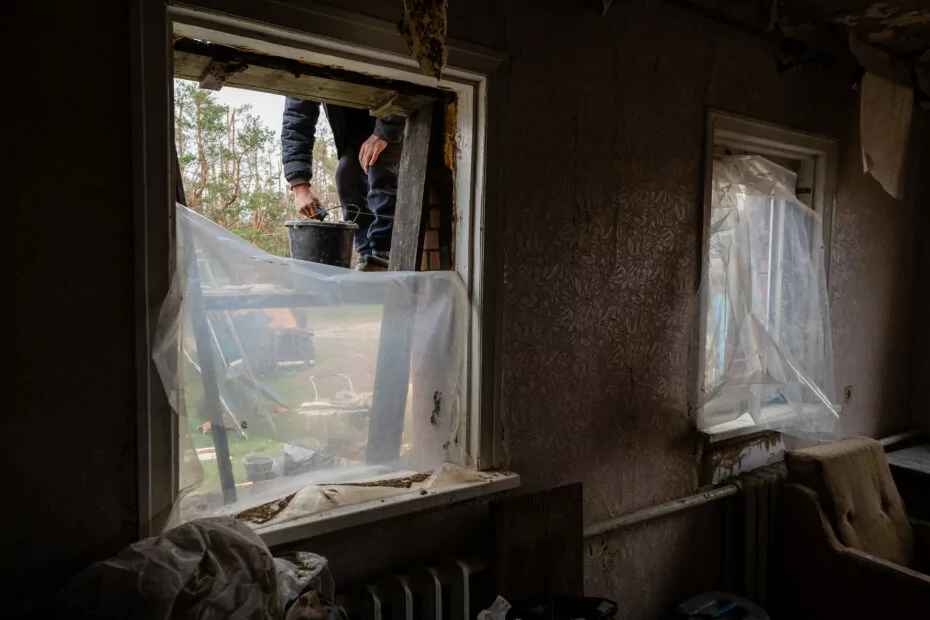
“There were guys from different parts of Russia here, but only Buryats [one of the Russian ethnic minorities – ed.] were the ones who abused people. Those who seemed suspicious to them were beaten. They even had their torture chamber or something similar in Lyptsi [a village 20 km from Kharkiv, was under Russian occupation from Feb. 24 to Sept. 12, 2022 – ed.], where they tortured everyone. Those Buryats are like felt boots [an expression to indicate a simpleminded person – ed.]. They do what they are told,” Vitalii remembers. “There was one incident: two young boys killed the other. He was such a person that he never kept silent. That was his nature. He was beaten to death and here, near the bridge, thrown out.”
A man climbs down a ladder to get some bricks. He pulls the cap down so that it covers his ears more tightly.
“They had several roadblocks around here. They constantly walked the streets – they could ask to undress to check tattoos on the body,” says Vitalii. “They came to me several times – looking for people ready to adjust fire attacks, but they did not find anyone. I don’t think they succeeded even once because ours [our people – ed.] did not betray each other.”
Vitalii climbs back up the ladder, puts brick after brick, then points to the house up the street.
“There, a woman was wounded on her own porch before last Easter,” the man returns to work but continues to speak. “Right there, Oksana’s mother was also shot in the stomach. She died in the hospital.”
Our core values are independence and quality. And here, we cannot carry on without your support. By joining our Patreon, you become a part of building a democratic and free Ukraine. Let’s be brave together!
Oksana and Oleksii Yeremiyovych
– Dad, go to lunch!
A woman in a jacket dirty from building materials cooks macaroni in the kitchen to feed her father and crony Vitalik, who is helping the family rebuild the house. Not all the windows have been installed yet, so the wind blows through the rooms – inside, everyone wears outerwear to avoid catching a cold.
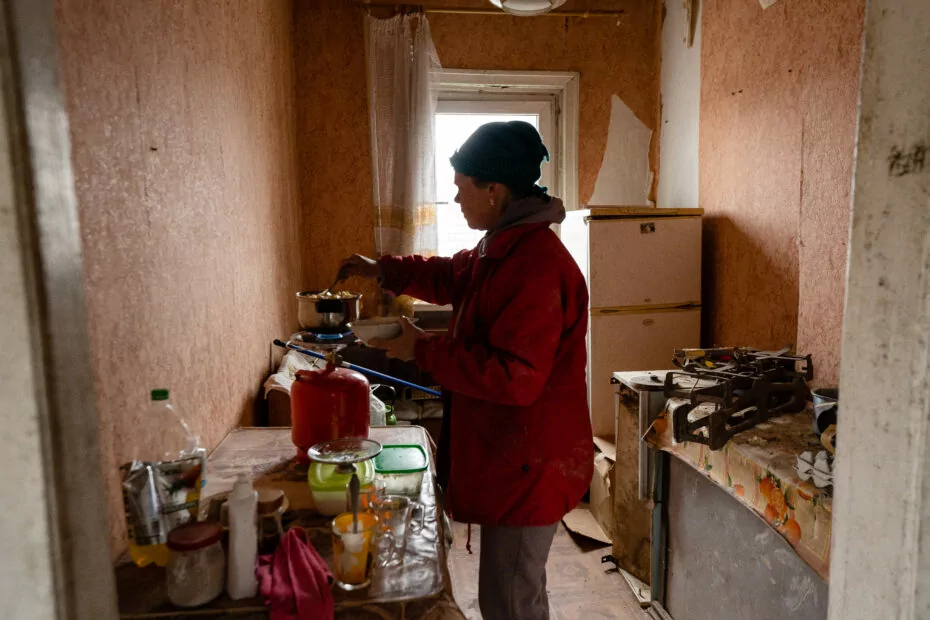
“On Feb. 24, 2022, I went to work in Kharkiv with my son in the morning — I worked in the COVID-19 department of the hospital. And came back only on Sept. 23. They just started letting people into Ruski Tyshky, and I arrived immediately. And dad was taken out of here on May 13: my son and nephew took him in the car after my house burned down on May 12,” says Oksana, stirring macaroni in a pan. “Dad!”
In 1975, Oksana’s father, Oleksii, moved from Rivne Oblast [Rivne is a northwestern Ukrainian city – ed.] to Ruski Tyshky, in the north of Kharkiv Oblast, where he built three houses next to each other for himself and his family. The former mechanic became a farmer in the 2000s to earn and feed his family. Before the full-scale invasion, the man had tractors, machinery, and harvesters on his farm, now utterly destroyed by the Russians. On May 9, 2022, a shell exploded in the yard when the elderly parents were in the house. Olha, Oksana’s mother, was standing close to the front door – she was hit by debris.
“Our soldiers arrived, and Dad immediately ran to their car for help. My mother was bundled up and taken to the hospital but did not survive – she died on the 19th [May – ed.],” says Oksana. “She was buried on May 21, and her birthday was on the 22nd.”
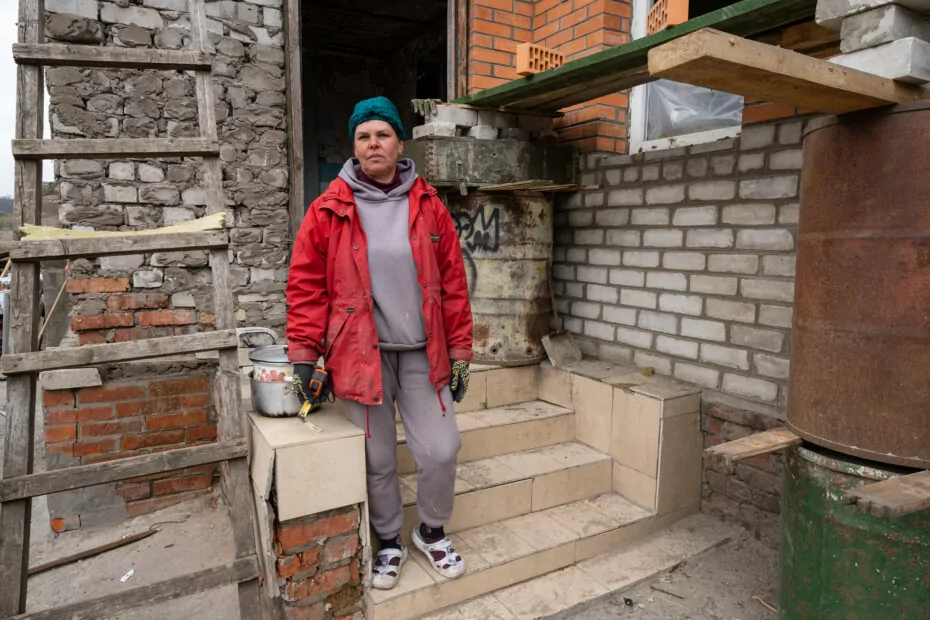
An older man enters the house as Oksana is telling her story. He listens to her, leaning on the door frame. Oleksii does not touch the handles to avoid smearing them with dust from building materials.
– Dad, tell them how it was here on Feb. 24.
“What’s there to tell? I remember that there was shooting in the nearby forest across the river, not here,” begins the man. “Three wives of border guards with children were hiding at my friends`, but someone betrayed them. The Russians took them to Lyptsi to interrogate.”
The man examines the room around him and enters from the corridor into the next room – it used to be a living room with a TV, a sofa, and a voluminous chandelier.
“On April 9, my eldest daughter and her husband left for Latvia via Russia,” recalls Oleksii.
“When we were liberated in May, there was such horror here, the Russians fired mercilessly. The wife was injured a month after the daughter’s departure, and the doors and windows were broken. The building was damaged but remained standing. And she did not survive.”
On May 13, Oleksii left for Kharkiv. Before that, he heard explosions and whistles every day and night, and a pine tree was constantly burning across the road. It was scary.
“Now rockets and projectiles do not hit. Explosions happen only when mines are detonated,” says Oleksii. “There are few people left here: my daughter and I, our neighbor Zhenia a few houses away, and two others down the street are renovating houses.”
The man looks out the window, trying to remember if he has forgotten anyone. One can see the forest from the living room with the sign “Mine Danger!” and burnt pines. After the liberation, boxes of Russian ammunition remained near Oleksii’s house. When the Ukrainian army liberated Ruski Tyshky, a man found an entire box of large-caliber cartridges, which he gave to the military.
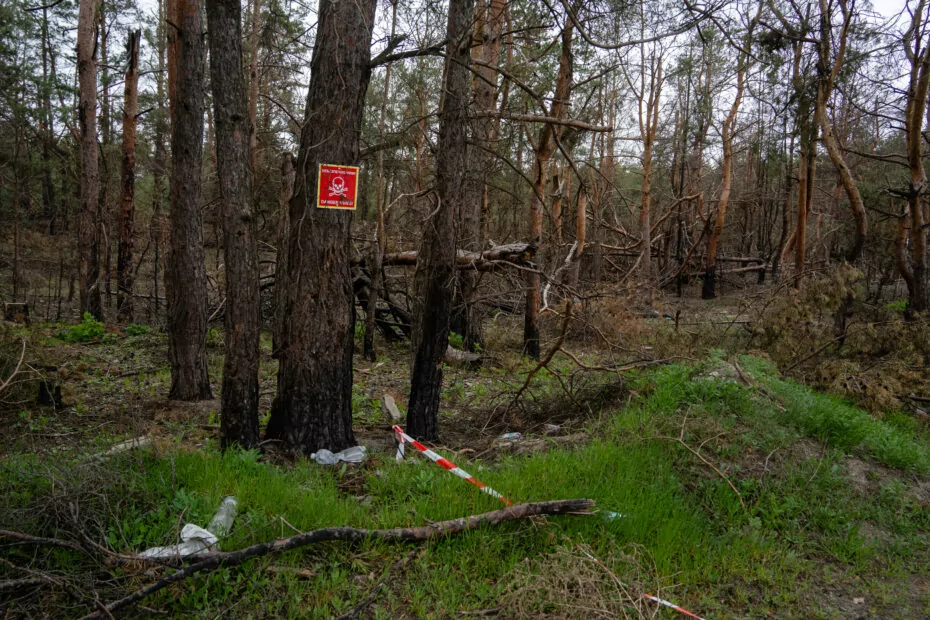
“In the fall, after returning, I went there to gather mushrooms,” says Oleksii, pointing to the forest.
– Isn’t it forbidden to go there because of the mine danger?
“There are no mines there. The Russians ran away so quickly that they didn’t have time to lay mines,” says Oleksii, smiling. “It was at night. They had just brought the ammunition as ours fired at them. The boxes caught fire, everything began to explode, and the Russians ran away. In short, we woke up at 6 a.m., and no one was there.”
Oleksii leaves the living room and goes outside, where a black dog meets him. The family called him Gypsy. Apart from him, Fox, who came to the yard pregnant in March, and Baby always live here. Gypsy drives the other dogs away from the house, but clowders of cats still gather on the roof of the burnt-out car.
“Many people lived under the occupation. When the village was liberated, volunteers began to take them out. Until then, it was possible to leave only through Russia,” recalls Oleksii, stroking the black dog. “My daughter, her husband, and seven other families drove to Shebekino [a city in Belgorod Oblast in Russia ~100 km from Kharkiv – ed.] via Vovchansk in six cars. The checks there were terrible. My daughter has already returned to Kharkiv, so we meet almost daily. A year ago, we did not have such an opportunity.”
Gypsy taps the owner’s hand to beg for more care while he talks. Oleksii smiles, looking at the dog.
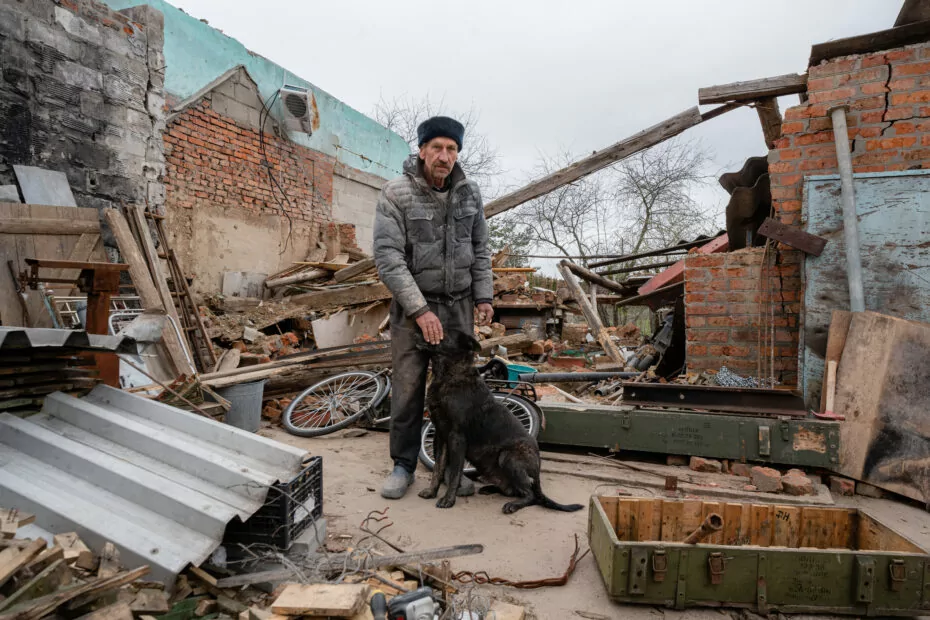
“29 explosions on my land plot. We applied to the community for reconstruction assistance. Just yesterday, they came to measure the windows. It seems we were allocated funds for it,” says Oleksii. “We have to wait a long time, but we live in someone else’s apartment. I haven’t been to Kharkiv for a week, as my home is here. I heat the place with firewood, and the light comes from a generator that I bought long ago when Tymoshenko was prime minister [Yulia Tymoshenko was Prime Minister of Ukraine from February to September 2005 and from December 2007 to March 2010 – ed.]. And during the occupation, I used it: I turned it on and watched TV.”
Besides dogs and cats, the family also had cows and pigs. When Oleksii left Ruski Tyshky, the man was forced to release the animals. He does not know where his farm animals are now.
— When I left in May, I untied all the dogs. One dog died, and I don’t know about the others. Only Baby remained from ours.
In the ruins of Oksana’s house, we see a burned-out washing machine, broken batteries, and the old clothes of the owners. On the wooden beams that used to be the floor, there is a pot with a cactus: it is unknown how it survived the shell explosion. Oksana moved it here from the premises that used to be the living room: the walls collapsed, but the cactus survived. Now it is not afraid of the wind.
Dzherelna
“Uncle Liosha, show them the burnt-out APC [armored personnel carrier – ed.],” Vitaliy calls on Oleksii. “It’s five minutes to go from here.”
The family lives on Dzherelna Street, where there is no surviving house.
Ruski Tyshky is the most affected settlement of the Tsyrkuny community; 90% of the village was destroyed.
Oleksii walks along the gate, behind which we can see a dilapidated house and a soft toy horse on a bench.
“The Russians sometimes gave humanitarian aid, but the bread was such that it was impossible to eat. They probably gave away leftovers from local stores. There was a butcher’s shop in the basement nearby, so the Russians distributed our meat,” says Oleksii. “A nurse in the local dispensary gave medicine to residents. Volunteers helped her.”
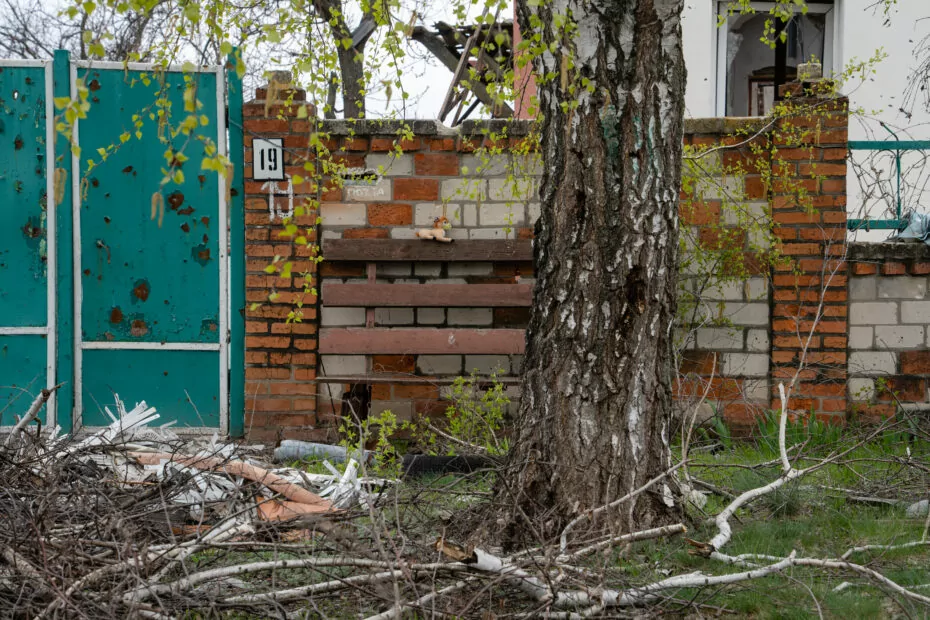
We bypass shell holes, some of which have fragments of rockets sticking out. A burnt tractor stands in one of the yards. Previously, a local farmer who left the village worked on it.
“No one has demined the fields yet, so the farmers do not go to work, but they are already working in the gardens in the yards,” says the man. “I have nothing to do, as there is not a single tractor running: one is broken in the yard, and the other two burned in the workshop.”
Almost every house on the street has its tragedy. Oleksii shares their stories, walking past the destruction.
“A woman was injured in this house. We helped her repair the roof during the occupation because a shell exploded in this yard. Then someone from the local area brought the flooring,” Oleksii points to another house. “On May 11, it hit here, so the family moved to a neighboring village. Only four houses on the street more or less survived. And in this house, the girl was wounded on May 8, and our soldiers then bandaged her.”
The street ends where a burned-out Russian armored personnel carrier stands near a field. It is called a local “acquisition.” Oleksii looks at it, remembering last spring.
– You know, I realized then that I have nothing to fear anymore. If it’s fate – I will stay alive.
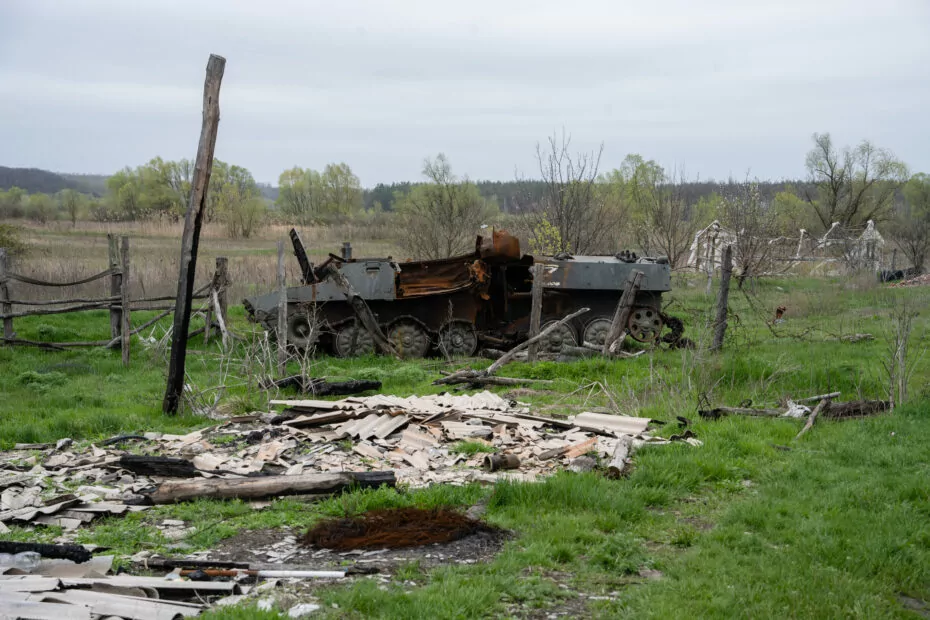
We are standing next to an armored personnel carrier. Ruined houses around us remind us of the war. One cannot escape it even by closing the eyes: memories are constantly chasing. But up the street, Oksana and Vitalik are bricking up a house that will soon be inhabited again. A cactus is growing on the ruins of the house, and two little puppies are sleeping in the basement. For them, life is just beginning.
by Vika Mankovska
translated by Tetiana Fram
Read more:
- Dovhenke, the Village Turned Into a Frontline
- Constant Missile Attacks and Empty Streets: How Kupiansk Lives on the Front Line
- The Place that Smells of Death: Liberated Kamianka
Follow us on Twitter, Instagram and LinkedIn for more news, stories, and field reports by Kharkiv journalists.
